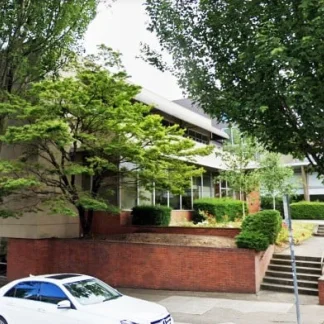Kellogg Creek
Kellogg Creek is a private rehab located in Milwaukie, Oregon. Kellogg Creek spe...
CODA is a substance use disorder rehab center located in Portland, OR. The facility offers comprehensive substance use disorder treatment to men, women, and women with children. Patients are also provided valuable resources such as supported housing and specialty services for pregnant women.
The levels of care offered by the facility includes outpatient treatment and three residential programs where patients are provided with individualized treatment plans. Services in addition to their levels of care include:
Separate treatment centers are available to men and women and permit parents to allow children to accompany them. These recovery centers operate in the 12 Step philosophy and offer a daily structure that focuses on safety and stability. All patients are assigned a room, provided meals, and are to attend meetings and groups. As patients progress, they are able to gain privileges to go on outings.
CODA offers medication assisted treatment (MAT) to help patients manage withdrawal symptoms. Medical providers help to determine the appropriate medication for each patient based on their specific needs.
The outpatient treatment programs at CODA offer counseling, patient and family education, and continuing care for individuals and families affected by substance use disorders. Treatment services are available Monday through Friday, 9:30 a.m. to 8:00 p.m.
Contact us for more information: (503) 239-8400

Connect with CODA Treatment Recovery by calling their admissions team directly.
(503) 239-8400 Website Get DirectionsThe Substance Abuse and Mental Health Services Administration (SAMHSA) is a branch of the U.S. Department of Health and Human Services. Established in 1992 by congress, SAMHSA's mission is to reduce the impact of substance abuse and mental illness on American's communities.
SAMHSA Listed: Yes
Research clearly demonstrates that recovery is far more successful and sustainable when loved ones like family members participate in rehab and substance abuse treatment. Genetic factors may be at play when it comes to drug and alcohol addiction, as well as mental health issues. Family dynamics often play a critical role in addiction triggers, and if properly educated, family members can be a strong source of support when it comes to rehabilitation.
Group therapy is any therapeutic work that happens in a group (not one-on-one). There are a number of different group therapy modalities, including support groups, experiential therapy, psycho-education, and more. Group therapy involves treatment as well as processing interaction between group members.
In individual therapy, a patient meets one-on-one with a trained psychologist or counselor. Therapy is a pivotal part of effective substance abuse treatment, as it often covers root causes of addiction, including challenges faced by the patient in their social, family, and work/school life.
Trauma therapy addresses traumatic incidents from a client's past that are likely affecting their present-day experience. Trauma is often one of the primary triggers and potential causes of addiction, and can stem from child sexual abuse, domestic violence, having a parent with a mental illness, losing one or both parents at a young age, teenage or adult sexual assault, or any number of other factors. The purpose of trauma therapy is to allow a patient to process trauma and move through and past it, with the help of trained and compassionate mental health professionals.
Group therapy is any therapeutic work that happens in a group (not one-on-one). There are a number of different group therapy modalities, including support groups, experiential therapy, psycho-education, and more. Group therapy involves treatment as well as processing interaction between group members.
In individual therapy, a patient meets one-on-one with a trained psychologist or counselor. Therapy is a pivotal part of effective substance abuse treatment, as it often covers root causes of addiction, including challenges faced by the patient in their social, family, and work/school life.
Trauma therapy addresses traumatic incidents from a client's past that are likely affecting their present-day experience. Trauma is often one of the primary triggers and potential causes of addiction, and can stem from child sexual abuse, domestic violence, having a parent with a mental illness, losing one or both parents at a young age, teenage or adult sexual assault, or any number of other factors. The purpose of trauma therapy is to allow a patient to process trauma and move through and past it, with the help of trained and compassionate mental health professionals.
In individual therapy, a patient meets one-on-one with a trained psychologist or counselor. Therapy is a pivotal part of effective substance abuse treatment, as it often covers root causes of addiction, including challenges faced by the patient in their social, family, and work/school life.
Trauma therapy addresses traumatic incidents from a client's past that are likely affecting their present-day experience. Trauma is often one of the primary triggers and potential causes of addiction, and can stem from child sexual abuse, domestic violence, having a parent with a mental illness, losing one or both parents at a young age, teenage or adult sexual assault, or any number of other factors. The purpose of trauma therapy is to allow a patient to process trauma and move through and past it, with the help of trained and compassionate mental health professionals.
Trauma therapy addresses traumatic incidents from a client's past that are likely affecting their present-day experience. Trauma is often one of the primary triggers and potential causes of addiction, and can stem from child sexual abuse, domestic violence, having a parent with a mental illness, losing one or both parents at a young age, teenage or adult sexual assault, or any number of other factors. The purpose of trauma therapy is to allow a patient to process trauma and move through and past it, with the help of trained and compassionate mental health professionals.
Kellogg Creek is a private rehab located in Milwaukie, Oregon. Kellogg Creek spe...
Stonebridge Rehabilitation is a private rehab located in Portland, Oregon. Stone...
BLVD Treatment Centers offers outpatient treatment for individuals with alcohol ...
CityTeam Portland is a non-profit rehab located in Portland, Oregon. CityTeam Po...